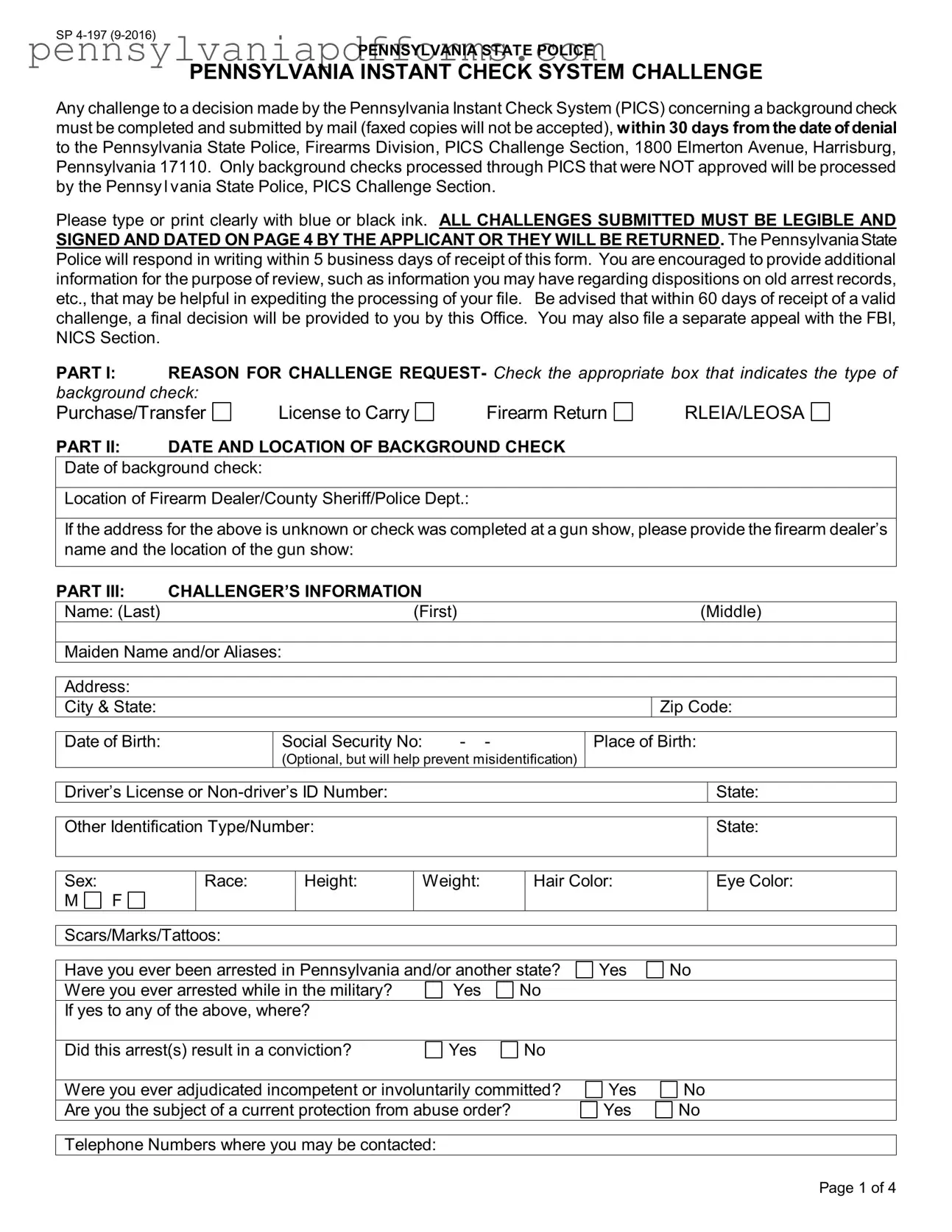
SP 4-197 (9-2016)
PENNSYLVANIA STATE POLICE
PENNSYLVANIA INSTANT CHECK SYSTEM CHALLENGE
Any challenge to a decision made by the Pennsylvania Instant Check System (PICS) concerning a background check must be completed and submitted by mail (faxed copies will not be accepted), within 30 days from the date ofdenial to the Pennsylvania State Police, Firearms Division, PICS Challenge Section, 1800 Elmerton Avenue, Harrisburg, Pennsylvania 17110. Only background checks processed through PICS that were NOT approved will be processed by the Pennsylvania State Police, PICS Challenge Section.
Please type or print clearly with blue or black ink. ALL CHALLENGES SUBMITTED MUST BE LEGIBLE AND SIGNED AND DATED ON PAGE 4 BY THE APPLICANT OR THEY WILL BE RETURNED. The PennsylvaniaState Police will respond in writing within 5 business days of receipt of this form. You are encouraged to provide additional information for the purpose of review, such as information you may have regarding dispositions on old arrest records, etc., that may be helpful in expediting the processing of your file. Be advised that within 60 days of receipt of a valid challenge, a final decision will be provided to you by this Office. You may also file a separate appeal with the FBI, NICS Section.
PART I: REASON FOR CHALLENGE REQUEST- Check the appropriate box that indicates the type of background check:
PART II: DATE AND LOCATION OF BACKGROUND CHECK
Date of background check:
Location of Firearm Dealer/County Sheriff/Police Dept.:
If the address for the above is unknown or check was completed at a gun show, please provide the firearm dealer’s name and the location of the gun show:
PART III: |
CHALLENGER’S INFORMATION |
|
|
|
|
|
|
Name: (Last) |
|
|
|
|
|
(First) |
|
|
|
(Middle) |
|
|
|
|
|
|
|
|
|
|
|
|
Maiden Name and/or Aliases: |
|
|
|
|
|
|
|
|
|
|
|
|
|
|
|
|
|
|
|
|
|
|
Address: |
|
|
|
|
|
|
|
|
|
|
|
|
City & State: |
|
|
|
|
|
|
|
|
|
|
Zip Code: |
|
|
|
|
|
|
|
|
|
|
|
|
Date of Birth: |
|
|
|
Social Security No: |
- - |
|
|
Place of Birth: |
|
|
|
|
|
(Optional, but will help prevent misidentification) |
|
|
|
|
|
|
|
|
|
|
|
|
|
Driver’s License or Non-driver’s ID Number: |
|
|
|
|
|
State: |
|
|
|
|
|
|
|
|
|
|
Other Identification Type/Number: |
|
|
|
|
|
State: |
|
|
|
|
|
|
|
|
|
|
|
|
|
|
|
|
|
|
|
|
|
|
|
|
Sex: |
|
|
Race: |
|
Height: |
|
Weight: |
|
Hair Color: |
|
Eye Color: |
M |
F |
|
|
|
|
|
|
|
|
|
|
|
|
|
|
|
|
|
|
|
|
|
|
Scars/Marks/Tattoos: |
|
|
|
|
|
|
|
|
|
|
|
|
Have you ever been arrested in Pennsylvania and/or another state? |
Yes |
No |
Were you ever arrested while in the military? |
Yes |
No |
|
|
|
If yes to any of the above, where? |
|
|
|
|
|
|
|
|
|
|
|
|
Did this arrest(s) result in a conviction? |
Yes |
No |
|
|
|
|
|
|
Were you ever adjudicated incompetent or involuntarily committed? |
Yes |
No |
Are you the subject of a current protection from abuse order? |
|
|
Yes |
No |
Telephone Numbers where you may be contacted:
Page 1 of 4
CHALLENGE PROCESS INFORMATION
The Pennsylvania Instant Check System (PICS) is required to check state and federal databases in order to determine an individual’s eligibility to acquire a firearm or license to carry a firearm. The following are
prohibitions which at the time of the background check would disqualify an individual from acquiring a firearm or license to carry a firearm.
1.Conviction of a crime enumerated in 18 Pa. C.S. section 6105(b), or any of the conditions of section 6105(c), of the Uniform Firearms Act. (See page 3 for specific information.)
2.Charged with or convicted of a crime punishable by imprisonment for a term exceeding one year, notincluding offenses pertaining to antitrust, unfair trade practices, restraints of trade, or regulation of business; or state offenses classified as misdemeanors and punishable by a term of imprisonment not to exceed two years.
3.Under indictment or information in any court for a crime for which the judge could imprison you for more than one year. An information is a formal accusation of a crime made by a prosecuting attorney. An indictment is a formal accusation of a crime presented to the court by a grand jury.
4.Conviction of an offense under the act of April 14, 1972 (P.L. 233, No. 64), known as the Controlled Substance, Drug, Device and Cosmetic Act (CSDDCA). As provided in 18 Pa. C.S. § 6109(1)(ii), any Pennsylvania drug conviction under the CSDDCA is prohibiting for a license to carry a firearm.
5.Adjudicated delinquent, within the past ten years, for a crime enumerated in 18 Pa.C.S. section 6105 of the Uniform Firearms Act, or for an offense under the Controlled Substance, Drug, Device and Cosmetic Act.
6.Addicted to or an unlawful user of marijuana or a stimulant, depressant, or narcotic drug.
7.Involuntarily committed to a hospital/health care facility for a mental health condition or other treatment, or adjudicated incompetent/incapacitated.
8.An alien illegally or unlawfully in the United States.
9.Discharged from the Armed Forces of the United States under dishonorable conditions.
10.Renounced United States citizenship.
11.Subject of a court order restraining you from harassing, stalking, or threatening an intimate partner or child of such partner.
12.Convicted in any court of a misdemeanor crime of domestic violence. This includes any misdemeanor conviction involving the use or attempted use of physical force committed by a current or former spouse, parent or guardian of the victim, or by a person with a similar relationship to the victim.
Section 6105(a)(1), effective November 22, 1995:
A person who has been convicted of an offense enumerated in subsection (b), within or without this Commonwealth, regardless of the length of sentence or whose conduct meets the criteria in subsection (c) shall not possess, use, control, sell, transfer or manufacture or obtain a license to possess, use, control, sell, transfer or manufactureafirearm in this Commonwealth.
Page 3 of 4

Section 6105(b) |
§3921 |
Theft by unlawful taking or disposition, upon conviction |
§908 |
Prohibited offensive weapons |
|
of the second felony offense |
§911 |
Corrupt organizations |
§3923 |
Theft by extortion, when the offense is accompanied by |
§912 |
Possession of weapon on school property |
|
threats of violence |
§2502 |
Murder |
§3925 |
Receiving stolen property, upon conviction of the |
§2503 |
Voluntary manslaughter |
|
second felony offense |
§2504 |
Involuntary manslaughter, if the offense is based on the |
§4906 |
False reports to law enforcement authorities, if the |
|
reckless use of a firearm |
|
fictitious report involved the theft of a firearm as |
§2702 |
Aggravated assault |
|
provided in 4906(c)(2) |
§2703 |
Assault by prisoner |
§4912 |
Impersonating a public servant, if the person is |
§2704 |
Assault by life prisoner |
|
impersonating a law enforcement officer |
§2709.1 Stalking |
§4952 |
Intimidation of witnesses or victims |
§2716 Weapons of mass destruction |
§4953 |
Retaliation against witness, victim or party |
§2901 |
Kidnapping |
§5121 |
Escape |
§2902 |
Unlawful restraint |
§5122 |
Weapons or implements for escape |
§2910 Luring a child into a motor vehicle or structure |
§5501(3) Riot |
§3121 |
Rape |
§5515 |
Prohibiting of paramilitary training |
§3123 |
Involuntary deviate sexual intercourse |
§5516 |
Facsimile weapons of mass destruction |
§3125 |
Aggravated indecent assault |
§6110.1 |
Possession of firearm by minor |
§3301 Arson and related offenses |
§6301 |
Corruption of minors |
§3302 Causing or risking catastrophe |
§6302 |
Sale or lease of weapons and explosives |
§3502 |
Burglary |
|
|
§3503 Criminal trespass, if the offense is graded a felony of the |
Any offense equivalent to any of the above-enumerated |
|
second degree or higher |
offenses under the prior laws of this Commonwealth, or any |
§3701 |
Robbery |
offense equivalent to any of the above-enumerated offenses |
§3702 |
Robbery of motor vehicle |
under the statutes of any other state or of the United States. |
Section 6105(c):
Effective November 22, 1995, 18 Pa.C.S. § 6105(c) also prohibits the following persons from possessing, using, controlling, transferring, manufacturing, or obtaining a license to possess, use, control, transfer, or manufacture a firearm in the Commonwealth of Pennsylvania.
ARE YOU A PERSON WHO:
1.is a fugitive from justice; or
2.has been convicted of an offense under the act of April 14, 1972 (P.L. 233, No. 64), known as The Controlled Substance, Drug, Device and Cosmetic Act, or any equivalent Federal statute or equivalent statute of any other state, that may be punishable by a term of imprisonment exceeding two years; or
3.has been convicted of driving under the influence of alcohol or controlled substance as provided in 75 Pa.C.S. § 3802 (relating to driving under influence of alcohol or controlled substance) or the former 75 Pa.C.S. § 3731, on three or more separate occasions within a five-year period. For the purposes of this paragraph only, the prohibition of Section 6105(a) shall only apply to transfers or purchases of firearms after the third conviction; or
4.has been adjudicated as an incompetent or who has been involuntarily committed to a mental institution for inpatient care and treatment under section 302, 303, or 304 of the provisions of the act of July 9, 1976 (P.L. 817, No. 143), known as the Mental Health Procedures Act; or
5.being an alien, is illegally or unlawfully in the United States; or
6.is the subject of an active protection from abuse order issued pursuant to 23 Pa.C.S. § 6108 (relating to relief), which order provides for the relinquishment of firearms during the period of time the order is in effect. This prohibition shall terminate upon the expiration or vacation of an active protection from abuse order or portion thereof relating to the relinquishment of firearms; or
7.was adjudicated delinquent by a court pursuant to 42 Pa.C.S. § 6341 (relating to adjudication) or under any equivalent Federal statute or statute of any other state as a result of conduct which if committed by an adult would constitute an offense under 18 Pa.C.S. sections 2502, 2503, 2702, 2703, 2704, 2901, 3121, 3123, 3301, 3502, 3701, and 3923; or
8.was adjudicated delinquent by a court pursuant to 42 Pa.C.S. § 6341 or under any equivalent Federal statute or statute of any other state as a result of conduct which if committed by an adult would constitute an offense enumerated in 18 Pa.C.S. § 6105(b) with the exception of those crimes set forth in paragraph 7. This prohibition shall terminate 15 years after the last applicable delinquent adjudication or upon the person reaching the age of 30, whichever is earlier.
9.is prohibited from possessing or acquiring a firearm under 18 U.S.C. § 922(g)(9) (relating to unlawful acts) who has been convicted in any court of a misdemeanor crime of domestic violence by a person in any of the following relationships: (i) the current or former
spouse, parent or guardian of the victim; (ii) a person with whom the victim shares a child in common; (iii) a person who cohabits with or has cohabited with the victim as a spouse, parent or guardian; or (iv) a person similarly situated to a spouse, parent, or guardian of the victim; then the relationship need not be an element of the offense to meet the requirements of this paragraph.
PRIVACY ACT NOTICE
Solicitation of this information is authorized under Title 18 Pa.C.S. § 6111. Disclosure of your social security number is voluntary. Your social security number, if provided, may be used to verify your identity and prevent misidentification. All information supplied, including your social security number, is confidential and not subject to public disclosure.
Page 4 of 4
The following information refers to situations most often misunderstood regarding denials.
1.Federal law prohibits a person who is under indictment for, or has been convicted of a crime that would be punishable by a term of imprisonment exceeding one year, or state misdemeanors punishable by a term of imprisonment exceeding two years (under current PA law, any offense graded as an M-1 or higher would be prohibiting). The key issue here is the maximum penalty you could have received for the crime, not the actual penalty that you did receive.
2.A conviction includes a finding of guilty or the entering of a plea of guilty or nolo contendere, whether or not judgment of sentence has been imposed, as determined by the law of the jurisdiction in which the prosecution was held. The term does not include a conviction which has been expunged or overturned or for which an individual has been pardoned unless the pardon expressly provides that the individual may not possess or transport firearms. State relief may still be required in order to fully restore firearm rights.
3.There are no time limits on old arrest records. If you have an old conviction for a charge that would be prohibiting, it will still prohibit you regardless of whether the record is 1 year old or 50 years old.
4.Many times an individual will hit on an old military record regarding AWOL or desertion. In most cases, all that is needed to clear this up is a copy of the individual’s honorable discharge. Also, military records often do not contain offense disposition information. If a copy of the official case disposition and a copy of the honorable discharge are provided, this may expedite research of the challenge.
________________________________________________________________________________
SELF CERTIFICATION
I hereby confirm that I have read all information contained in Form SP 4-197, Pennsylvania Instant Check System Challenge.
I understand that if I knowingly make any false statements herein, I am subject to penalties prescribed by law. This certification/acknowledgment is made subject to both the penalties of section 4904 of the Crimes Code (18 Pa. C.S. § 4904, relating to unsworn falsification to authorities), a misdemeanor of the third degree, subject to not more than one year of imprisonment and/or a fine not exceeding $2,500; and the Uniform Firearms Act, which is a felony of the third degree, subject to not more than 7 years imprisonment and/or a fine not exceeding $15,000.
I hereby authorize the Pennsylvania State Police to receive any documents, including mental health documents, as well as physician’s determination relating to commitment, necessary to make
a determination with regard to this challenge. I waive any rights to confidentiality in these documents by signing this certification.
NOTE: All challenges submitted must be signed, dated, and complete. Pages 1 through 4 must be submitted for a challenge to be considered complete. Any challenge received that is not filled out completely, signed, and dated will be returned.
Page 5 of 4






